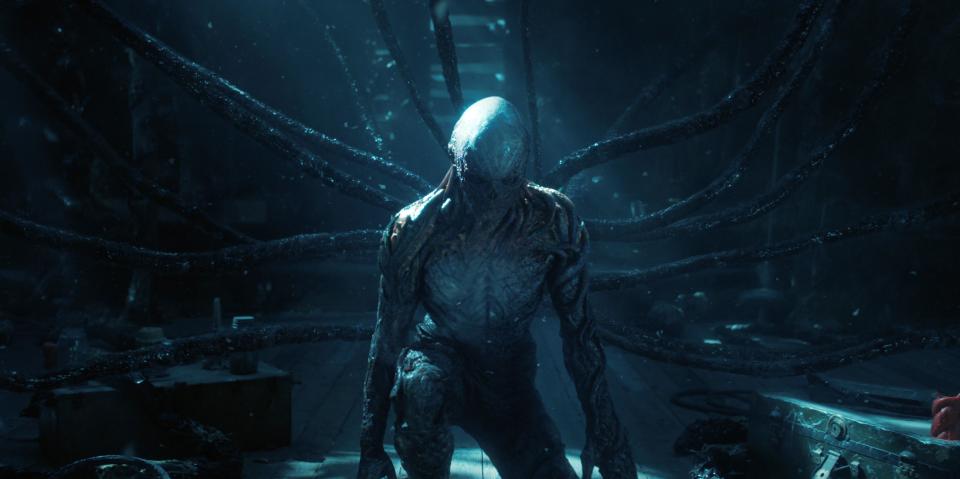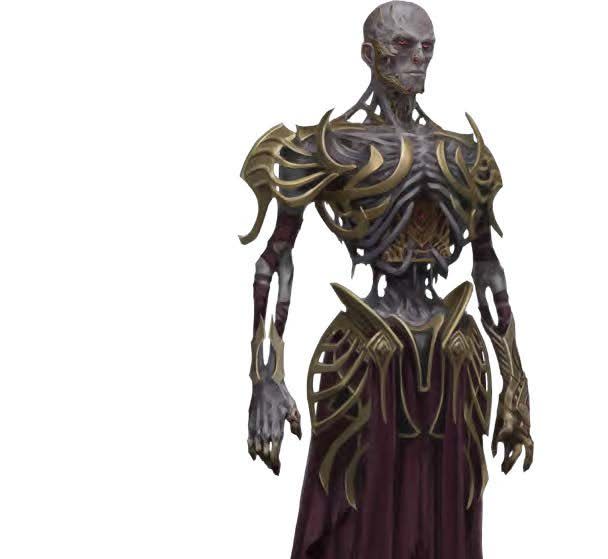The Dungeons & Dragons History of Vecna, the New Stranger Things Villain

Vecna in 'Stranger Things' Credit - Courtesy of Netflix
There’s a new big bad lurking in the Upside Down in season 4 of Stranger Things, now streaming. As with the series’ previous villains—remember the Demogorgon and Mind Flayer?—the evil force that Eleven and the gang have to face this year takes its name from a classic Dungeons & Dragons monster. A being known as Vecna threatens Hawkins, Indiana, just as Vecna the evil arch-lich threatened D&D players for decades.
While Stranger Things’ villains are not exact copies of the D&D monsters they take inspiration from, the characters on the shows are avid players of the iconic tabletop game, as were the series’ creators, the Duffer Brothers, in real life. As a result, there are several parallels between D&D and Stranger Things, not least including season 4’s addition of Vecna. Here’s what you need to know about the classic monster before jumping into the new Stranger Things episodes.
Who is Vecna?
Vecna, a being from the earliest days of D&D lore, was not a fully formed character when he made his debut in the “The White Box,” the very first version of D&D that creators Gary Gygax and Dave Arneson released in 1974, according to Chris Perkins, game design architect at D&D. That’s in part because that original game had “a very crude presentation” rather than the detailed lore D&D has today, and in part because, initially, Vecna was just that: parts.
“Vecna was this enigmatic figure, originally. We didn’t know much about him other than something happened and this powerful wizard became an undead wizard and then was destroyed, leaving behind an eyeball and a left hand,” Perkins tells TIME. “Those were great artifacts of power in early D&D.”
Vecna became a legendary figure whose remains were powerful items that Dungeon Masters (DM) could use as rewards for their players. In order to use Vecna’s Hand or Eye, players would need to have their characters carve out their own eye or lop off their own arm.
From the beginning, Vecna was a long-vanquished lich—a wizard who used dark forbidden magics to keep themselves effectively immortal but in a perpetual state of undead decay—and while DMs were free to use their imagination and flesh him out into a proper villain, his only official existence in the old D&D books was as two magic items made from remains of his body.
But the release of the game’s Second Edition in 1989 saw Vecna get more character development. In the Second Edition, DMs could have their players interact with or fight in adventures with thrilling names like Die Vecna Die! Gradually, a theme emerged: This once-human man would employ dark powers in his quest for more knowledge and power, eventually ascending to godhood—and beyond.
“He was a mortal, [but] he’s always looking for the next big thing,” Perkins says. “Godhood was sort of his quest for a long, long time. When he finally achieved it with Fourth Edition, that probably didn’t satisfy him. Now he wants to be the greatest of the gods, eliminate all rivals, and learn the secrets of the multiverse itself.”

How Vecna—and Dungeons & Dragons—fits into Stranger Things
The Stranger Things kids would not be familiar with this more fully formed Vecna, as the latest season is set in 1986, prior to the release of the books that expanded his backstory. Given that so much of D&D relies on the Dungeon Master making things up, it’s not by any means a plot hole that the Stranger Things kids would be familiar enough with the lich behind the artifacts to name their latest Upside Down foe after him. And, seeing as the Duffer Brothers certainly kept up with D&D, it seems reasonable that Vecna’s post-’80s history might have influenced his depiction in the show.
D&D has been a part of Stranger Things from the start. The series begins with four friends playing a game that had their party of characters face off against a classic D&D foe named Demogorgon. When Will Byers goes missing and a monster from the Upside Down haunts them, the kids named the beast after the most dangerous, evil monster they knew: The Demogorgon from their D&D campaign. In season 2, they continued this naming convention by giving the Upside Down’s big bad the name of another iconic D&D villain, the Mind Flayer. Throughout the seasons, the kids have continued to play D&D, and season 4 also features a plotline involving the real-life moral panic over Dungeons & Dragons, metal music, and other supposedly Satanic pop culture that ran amok in the ‘80s. (However, Perkins says there wasn’t really a specific connection to Vecna and this misguided Satanic panic because the lich was more of an enigma compared to the actual devils and demons in the pages of the Monster Manual.)
Netflix revealed very few details about Vecna’s inclusion in Stranger Things season 4 beyond the name and a glimpse of the monster—who looks much more human than the Demogorgon or the Mind Flayer. While not an exact match of Vecna as he’s been portrayed in D&D over the years, there’s a skeletal, undead, lich-like look to the Stranger Things version. Picture a tentacle-covered Freddy Kruger and you’re not too far off.

We won’t spoil exactly what the deal is with Stranger Things’ Vecna, but we will say that he shares more than just a name with the D&D version. Vecna’s exact depiction in D&D differs over the various books editions, and each individual table of players in the improv-heavy game can be wildly different, but if there’s a core to Vecna, it’s this: He had humble beginnings, searched for more knowledge, and eventually ascended to new levels of power using dubious means at the expense of his own humanity. There are certainly echoes of this in his Upside Down counterpart.
“There is a cold calculation to Vecna,” Perkins says. “I think we don’t ever dig down into layers of psyche that would reveal anything other than that. He’s always deliberately sort of cast as an enigmatic or shadowy or mysterious figure whose true motives tend to be inscrutable, but I think whenever he’s shown up, he’s been cold and calculating.”
Prior to the release of the season, Perkins didn’t know how much Stranger Things’ Vecna would or would not be like the D&D baddie. He explains that Netflix reached out to Wizards of the Coast and that D&D’s franchise team worked with them to help provide inspiration and answer any questions. As part of this, the franchise team commissioned new concept art for Vecna and put a story guide together they could give to Netflix for them to use or not. In other words, the Duffer Brothers had access to Vecna’s D&D lore, so it’s up to them on how much of it they wanted to use.
Regardless of the fidelity of Stranger Things’ Vecna, it’s clear why the show would want to borrow his name, because Perkins counts him as one of D&D’s most iconic villains, one who has endured through all the many editions of the game. “If I were to get my list of top three villains, it would probably be Vecna, who is the iconic lich; Strahd, who is the iconic vampire; and probably Demogorgon, who is the iconic demon lord,” he says.
Read More: We Just Got a Look at Who’s Coming Back for Stranger Things Season 4. Here’s Everything We Know About Your Favorite Netflix Binge
How Dungeons & Dragons could shape future Stranger Things episodes
With one season to go, there’s a chance that Stranger Things could borrow another D&D monster’s name for the next bag guy. Perkins—who has no insider information—says he’s fond of Lolth, the Demon Queen of Spiders, but that he personally wouldn’t mind seeing Orcus, a Demon Lord and master of the undead, make his way to the show. “He’s got a connection to Vecna that few people know because, as the Prince of Undeath, Orcus holds the secret to lichdom,” Perkins says. “He basically gives it out to powerful wizards who pay deference to him or honor him in some way. So it’s possible Vecna actually pried the secrets of lichdom from Orcus.”
If Orcus pops up in Stranger Things 5, you heard it here first. To use D&D terminology, call it some divination magic.

 Yahoo Movies
Yahoo Movies 